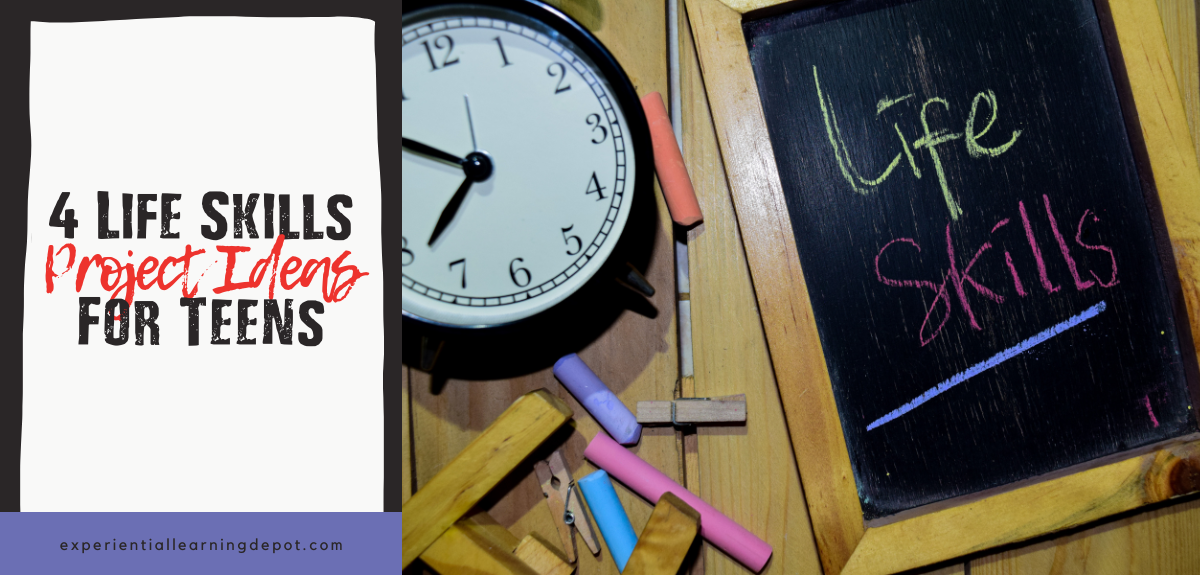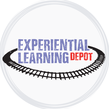|
Experiential learning resources for the innovative educator
What are some essential life skills and how can you as a teacher help your high school students build these essential skills? With experiential learning! This post offers some life skills example projects to inspire you! Let’s take a look! Experiential learning is so strongly rooted in real and authentic learning, and what is more real (or more important) than your high schoolers having essential life skills when they graduate and are off on their own? I place a lot of emphasis and importance on building life skills with my high school students, and I do so with experiential projects. What is an experiential project? It is basically an experience that requires the use of life skills by nature. These projects ask students to manage and lead a real experience, one that they would likely encounter at some point in their lives. Your students could certainly go through life skills exercises, which is a fine idea. But it is also important to use those life skills in a real life context, not just within the boundaries of a classroom or a worksheet. Experiential projects put learners in real-world situations where life skills are needed, and this blog post is all about life skills example projects that you can do with your own high school kids! Before diving into some of those life skills example projects, let’s talk about some life skills. What are some important life skills for kids of all ages to work toward? What are some life skills that will be needed not just at school, but out in the world? Here are some life skills that I prioritize in my curriculum:
And there are so many more! But these, I’ve found, come up a lot in 21st-century life. Let’s take a look at some real-world and authentic life skills example projects that organically incorporate opportunities to build these essential life skills. Four Life Skills Example Projects for High School Students1. Plan a Dinner Party on a Budget This is a favorite life skills example project for my high school students. Students plan a hypothetical dinner party with the option of actually hosting this party. Students develop a menu for a 10-person dinner party under a set budget. They research recipes or develop their own to be included on the menu. They break down quantities of each ingredient needed and plan a (hypothetical) menu with several courses, all while incorporating outside-of-the-box money-saving tricks. This is an incredible life skills example project for students to build the following skills: Budgeting, planning, organizing, teamwork, task management, collaboration, math skills (fractions), and writing. I have a Dinner Party on a Budget PBL resource that was designed to also incorporate the following life skills: Problem-solving, creativity, and tech literacy. And because the resource includes the phases of design thinking, students develop the desire to continuously improve. 2. Road Trip on a Budget This life skills example project, planning a road trip on a budget, is not only an incredible opportunity to build life skills, but students could actually apply it to life down the line. Having students plan a hypothetical (or real) road trip not only offers a canvas for students to build life skills, but it’s also really fun and engaging, especially if you give your students choices. Students can choose their routes, decide on their own budget and work within it, decide on the itinerary and timeline, and so much more. They can even decide their final product and what to do with it. This is an incredible life skills example project for students to build skills and m my Road Trip on a Budget teaching resource simplifies this experience for everyone. This Life Skills Project was designed with the following life skills in mind: Planning, organizing, estimating, time management, decision-making, problem-solving, mapping, budgeting, tech literacy, research, writing, and communication. “I have been working on budgeting with my high school students and they loved the flexibility and uniqueness of this project. I loved how it was all laid out and pretty much print and go!” — Amy M 3. Plan and Host a Fundraiser A fantastic way to encourage students to build essential life skills is through fundraising. Students plan the logistics of a fundraiser, and in an ideal world, would actually execute the fundraiser that they’ve planned. Students could choose to raise money for classroom materials, field trips, or for community issues that are important and relevant to them. I love planning and hosting fundraisers as a life skills example project for a lot of reasons, but one reason that sets this project apart from the others is that it has the potential for building social-emotional skills such as empathy and compassion (for community issue fundraiser). The process of planning a fundraiser can be tricky. There are a lot of moving parts. That is why I created a Student-Led Fundraiser Resource, which helps guide students seamlessly from planning to execution. This life skills example resource maximizes opportunities for building life skills such as: Project-management skills, problem-solving, teamwork, collaboration, budgeting, communication, leadership, collaboration, networking, organization, planning, critical thinking, graphing, interpreting data, and more! 4. Develop and Start a Business Developing and starting a business is my favorite life skills example project because it is SO real, applicable, and beneficial to students. The idea of having your students start their own businesses might seem overwhelming and daunting, however, it doesn’t have to be, and I can tell you from experience that it isn’t that bad, especially with the right resources. Going through the steps of starting a business as a teenager helps students build the skills to start a business in the future. The businesses that they build now for life skills example project doesn’t have to be intense. They should look at it as a summer job or side hustle. For example, I have had students start tutoring, babysitting, photography, and cake decorating businesses. I am currently working with a group of AVID 9th graders that are going through the motions of developing their businesses now so that they can launch them this summer. They are 9th graders! Not seniors, not in college, not adults, and they are doing an amazing job. Some of the businesses that are being developed by these kids include graduation party planning, lawn services, and house cleaning services. These businesses are totally doable and my 9th graders are well on their way! I have a teaching resource for developing and starting a business. This entrepreneurial life skills example project was designed with the following life skills in mind: Creative problem-solving, communication, budgeting, market research, marketing, forecasting, technical writing, leadership, communication, networking, organization, planning, and more! “I had 55+ students start their businesses by using this resource. We then invited the public in to shop one evening and the students sold their products and services. It was extremely successful and will definitely use this resource next year!” — Danielle B. BONUS Project: AI Literacy Letting my students use artificial intelligence? No way! Okay, hear me out. The other day I introduced ChatGPT to my 4th grader. I have been using AI regularly in my daily life to make daily tasks more efficient and effective, and wanted to show it off to my kid. He was working on his homework, and the assignment was to write a story that takes place on Halloween night. I pulled up ChatGPT, added a prompt asking ChatGPT to produce an original story about Halloween night, and it pulled up an incredibly written and entertaining murder mystery story. My child was blown away, and then said, "that's going to be my story?" An instant feeling of regret came over me. Had I made a mistake showing him this AI tool? But here's what ended up happening. He DID NOT use ChatGPT's story as his own because it brought up the discussion of plagiarism, integrity, and more. I said, "No, you can't claim this story as your own and turn it in for school credit. But how could you use it in an ethical and effective way?" He replied with: "I could read this murder mystery story for my reading homework tonight?" AI doesn't have to be scary. It is there whether we like it or not. If I had not shown my child this AI tool he would have discovered it another way and wouldn't have necessarily had the follow up conversation about ethical and effective use of these tools. There are incredible opportunities for skill-building, including tech literacy, when you open learners' eyes to AI tools. Here's a project example: Ask students to choose an every day task such as planning chores for the week, baking a cake, planning a party, reorganizing the kitchen, etc. Then have them explore AI tools that could help with the different steps of the task. An additional learning opportunity would be to then have students develop video tutorials on how to do these every day tasks using AI as a support tool. Click here to grab this ready-made AI PBL resource. These life skills example project ideas are so engaging and fun for the kids, but they are also super useful and applicable to real life. It makes good sense to teach kids life skills through real-life experiences right? So get out there and try some with your high school students! Help set the stage for useful and practical skill-building. If you are interested in all four life skills example projects, check out this high school life skills bundle! Each of the four high school life skills projects that I talked about here is included, and bundling them together saves you money! Also, the AI project mentioned above is thrown in as a free FREE BONUS! Leave a comment! Which of the four life skills example projects included in this blog post sounds the most useful to you? See you next time! Helpful Blog Posts: Online Courses: Join our experiential learning Facebook group!
Did you know there is an experiential learning Facebook group? Check that out - Experiential Learning Community for K12 Teachers - and join in the discussion about experiential learning ideas! Find us on social media! Follow Experiential Learning Depot on Pinterest, Facebook, Youtube, and Instagram for more on experiential education, and check out my shop for experiential learning resources. Observe. Question. Explore. Share.
0 Comments
Your comment will be posted after it is approved.
Leave a Reply. |
Blog IntentTo provide innovative educational resources for educators, parents, and students, that go beyond lecture and worksheets. AuthorSara Segar, experiential life-science educator and advisor, curriculum writer, and mother of two. Categories
All
|


















 RSS Feed
RSS Feed